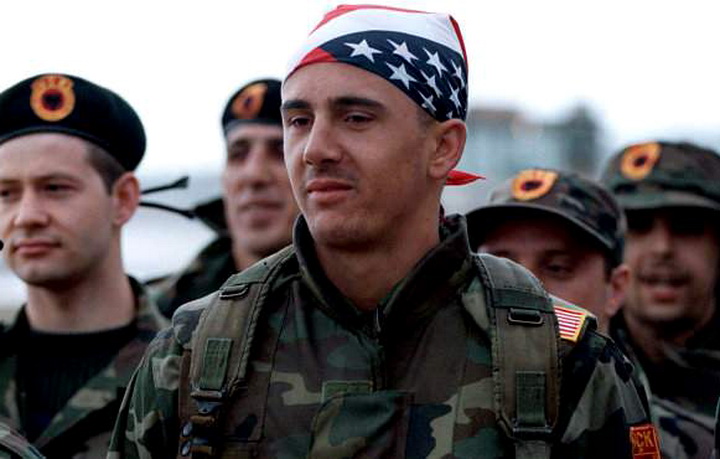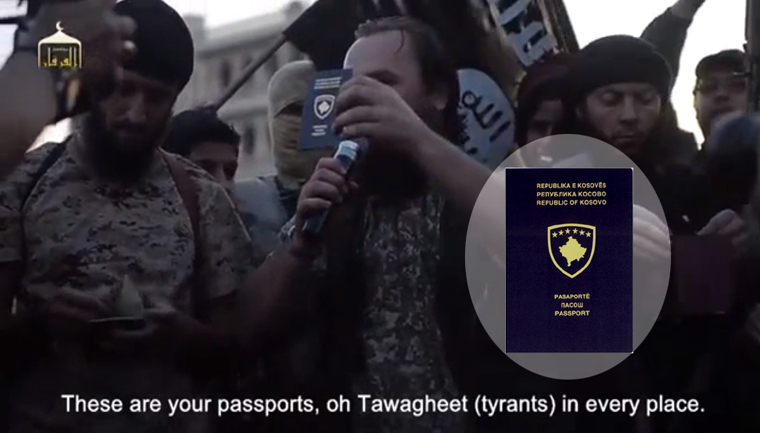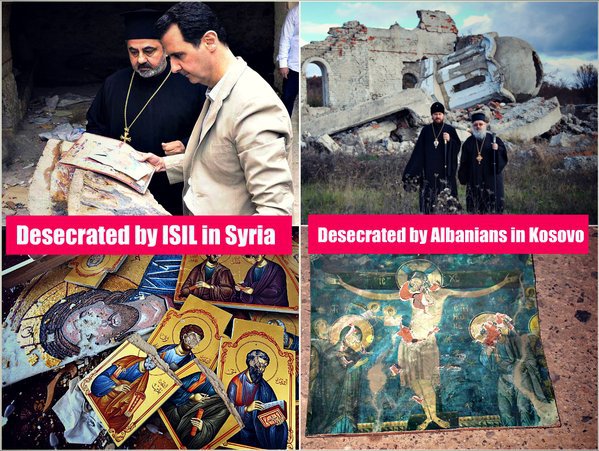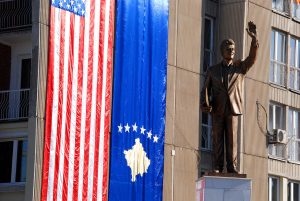
Views: 659
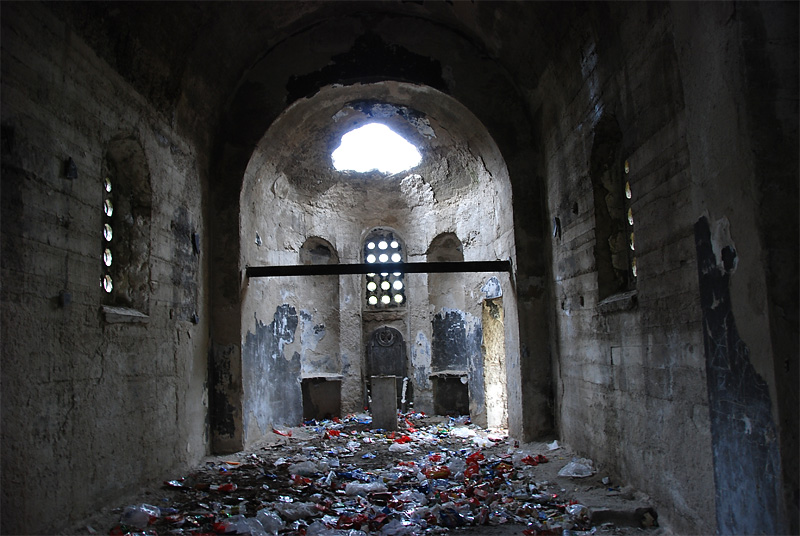
During the Kosovo conflict in 1999, military intervention by the US and NATO was precipitated by the use of outright lies and deceptions. The conflict was “ostensibly about preventing “genocide” on the scale of the Holocaust. This was the Big Lie. This was the Noble Lie. In fact, the conflict was about secession and separatism and the creation of a US-sponsored Greater Albania. Why was the Noble Lie needed? A deception was needed because US policy was supporting an illegal land grab, a forceful take-over of territory from a sovereign nation, Yugoslavia.
Why and how could such lies and deceptions occur in a so-called democracy? How do you explain it? The Noble Lie goes back to at least Plato in Western history.
In The Republic, Part III, Plato, described “the noble lie” which rulers told their citizens. For Plato, it was the elites who could tell “the noble lie”, to maintain societal stability and to ensure a contented and satisfied population. In Plato’s ideal Republic, or city-state, there were three hierarchical classes: The Guardians, the Soldiers, and the Workers. The Rulers were selectetd from the Guardians class, the “philosophers”. Next were the Auxiliaries class, or Soldiers. The third class was made up of Workers, the laborers, craftsmen, and the farmers.
For Plato, a “noble lie” or a “noble myth” was needed to maintain the hierarchical structure, to maintain the moral order, and to keep the society functioning in a productive manner.
Plato begins by stating that the “truth” should be valued, but that “lies” are sometimes necessary or required. He restricts their use to special persons only who represent the community, society, or the state or government:
“Again, truth should be highly valued; if, as we were saying , a lie is useless to the gods, and useful only as a medicine to men, then the use of such medicines should be restricted to physicians; private individuals have no business with them.”
For Plato, ideally, only the government could tell the “noble lie”, not private individuals. The government could tell the “noble lie” if it was “for the public good”:
“Then if anyone at all is to have the privilege of lying, the rulers of the State should be the persons; and they, in their dealings either with enemies or with their own citizens, may be allowed to lie for the public good. But nobody else should meddle with anything of the kind; and although the rulers have this privilege, for a private man to lie to them in return is to be deemed a more heinous fault.”
What is an example of a “noble lie” in Plato’s Republic?:
“How then may we devise one of those needful falsehoods of which we lately spoke—just one royal lie which may deceive the rulers, if that be possible, and at any rate the rest of the city?”
Plato then relates the “fiction” or “tale” or “necessary falsehoods” of how mankind is divided into gold, silver, brass, and iron, a hierarchical system that mirrored classes in society. For Plato, this “noble lie”, or metaphor, is necessary because “the fostering of such a belief will make them care more for the city and for one another.” A noble lie will make the citizens of the polis, of The Republic, more civic-minded and patriotic and will ensure communal bonding and cohesiveness and a sense of community. In short, the metaphor is necessary to rationalize and to justify the rigid hierarchy. Ultimately, the noble lie fosters the public good.
 The noble lie is similar to Reinhold Niebuhr’s “necessary illusion”, a fiction that an individual needed to function effectively and productively in a modern society. For Niebuhr, “rationality belongs to the cool observers”, experts and elites who are detached and learned on a particular issue. “Democracy”, for Niebuhr, “is finding proximate solutions to insoluble problems.” The elites and the experts have to decide the difficult and complex issues.
The noble lie is similar to Reinhold Niebuhr’s “necessary illusion”, a fiction that an individual needed to function effectively and productively in a modern society. For Niebuhr, “rationality belongs to the cool observers”, experts and elites who are detached and learned on a particular issue. “Democracy”, for Niebuhr, “is finding proximate solutions to insoluble problems.” The elites and the experts have to decide the difficult and complex issues.
What role does the noble lie have in democracy? Walter Lippmann, in Public Opinion (1922), argued that a “governing class”, similar to Plato’s “guardian class”, must emerge in a democracy that would give order and direction out of the “chaos of local opinions.” For Lippmann, “a specialized class whose interests reach beyond the locality” must inform democratic society. This was a specialized class of “elites” made up of experts, specialists and bureaucrats. Today, this specialized class of elites includes members of think tanks, professors, analysts, “senior diplomats”, and commentators. These were “intellectual elites” who would, in essence, tell the crowd, the herd, the mob, in a democracy, what to think, and how to think. Intellectual elites are needed because in a democracy there is no such thing as an “omnicompetent citizen”. Citizens in a democracy are ignorant. They only have knowledge on some issues, but not on others. This is why elites and experts are necessary to walk people through the complexities and ambiguities of the issues.
The people in a democracy do not act or think rationally, and therefore, cannot know the public good, what is best for themselves or for others, or for their nation. As Alexander Hamilton noted: “Your people, sir, is nothing but a great beast”. For Hamilton, the masses in a democracy do not know what is in their best interest or what is in the national interest: “The people are turbulent and changing; they seldom judge or determine right. ” The people do not know what is the “public good”. In other words, no single individual could ever know everything about the many issues in a democracy. What they do know is shallow in depth, primitive, crude, and unsophisticated. For this reason, the intellectual elites are needed to aid and to assist the primitive, unsophisticated, and ignorant individual in a democracy.
What guides the masses, the people, in a democracy? According to Lippmann, it is images, images we have in our heads: “We are all captives of the picture in our head—our belief that the world we have experienced is the world that really exists.” The image, not the actual reality, is everything. Manipulate the image and you change the perception of reality.
Lippmann explained that when telling the people “truths” in a democracy, there is a necessary degradation that occurs. Intellectual elites are needed to explain the issues to the crude and primitive and unsophisticated masses: “When distant and unfamiliar and complex things are communicated to great masses of people, the truth suffers a considerable and often a radical distortion. The complex is made over into the simple, the hypothetical into the dogmatic, and the relative into an absolute.”
This is the dominant “narrative” or paradigm in “manufacturing consent” in a democracy. Indeed, this is the way it actually works in practice.
Lippmann’s theoretical groundwork was taken a step further by Edward L. Bernays, regarded as a pioneer in public relations in the US. For Bernays, “manufacturing consent” or “engineering consent” was crucial in a democracy: “The conscious and intelligent manipulation of the organized habits and opinions of the masses is an important element in democratic society.”
Bernays described how there was an “engineering of consent” in the US by intellectual elites: “We are governed, our minds are molded, our tastes formed, our ideas suggested, largely by men we have never heard of. This is a logical result of the way in which our democratic society is organized.” For Bernays, this manipulation is necessary in democracy. Indeed, it is fundamental to American democracy.
These “enlightened” elites control the “public mind” or the “group mind”: “It is they who pull the wires which control the public mind.”
The ultimate object is to control the masses in a democracy, to manipulate them through the noble lie to do what they otherwise would not do: “If we understand the mechanism and motives of the group mind, is it not possible to control and regiment the masses according to our will without their knowing about it?”
Bernays argued that the organized manipulation of the masses by elites was fundamental to a democracy. Democracy is juxtaposed to totalitarianism. Joseph Goebbels and Nazi propaganda are always cited as if they are unique to Nazism and to totalitarianism. What is suppressed, however, is the fact that Joseph Goebbels derives many of his propaganda techniques from Bermays and Lippmann. The techniques of Nazi propaganda were based on American democratic models of engineering and manufacturing consent. Bernays’ seminal book Crystallizing Public Opinion (1923) was a source for much of Goebbels’ Nazi propaganda techniques. Bernays himself admitted this in his book Biography of an Idea: “Goebbels, said [Karl von] Weigand, was using my book Crystallizing Public Opinion as a basis for his destructive campaign against the Jews of Germany.” Remarkably, Bernays regarded this as vindication of the effectiveness and soundness of his techniques. His techniques continue to be the guides on how consent is manufactured and engineered in the US.
To understand how and why we were manipulated and lied to on Kosovo, Bosnia, Krajina, and Iraq in 2003, you have to know about how public opinion is “manufactured” and “engineered” in a democracy.
Originally published in 2006-12-14
Author: Carl K. Savich
Source: Serbianna
Origins of images: Facebook, Twitter, Wikimedia, Wikipedia, Flickr, Google, Imageinjection & Pinterest.
Read our Disclaimer/Legal Statement!
Donate to Support Us
We would like to ask you to consider a small donation to help our team keep working. We accept no advertising and rely only on you, our readers, to keep us digging the truth on history, global politics and international relations.
FOLLOW US ON OUR SOCIAL PLATFORMS

